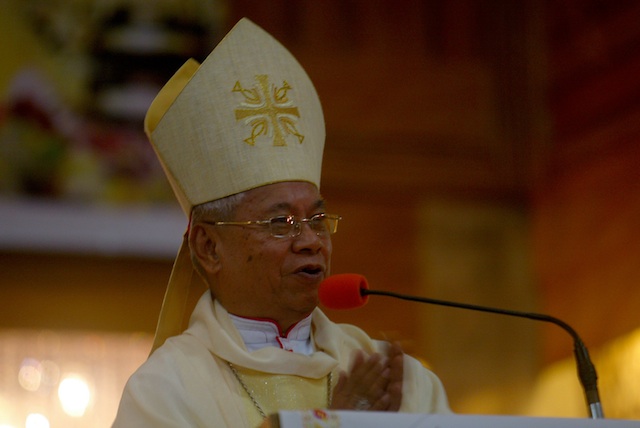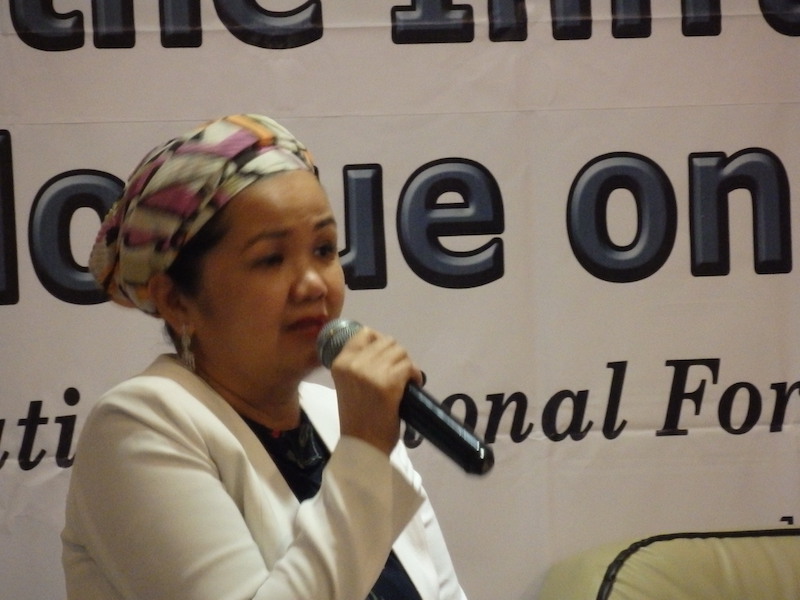DAVAO CITY (MindaNews / 13 May) — Moro leaders “must come up with a consensus” so that what is submitted to Congress in July is a “single, harmonized” draft Bangsamoro Basic Law (BBL) that incorporates the gains of the four peace agreements government signed with the Moro National Liberation Front (MNLF) and Moro Islamic Liberation Front (MILF) in the last four decades, Cardinal Orlando B. Quevedo, OMI and Deputy Speaker Bai Sandra Sema said.
In his 15-point “Credo on Peace in Bangsamoro Land”, Quevedo, Archbishop of Cotabato and Mindanao’s lone Cardinal, cited the need for the “main protagonists for peace” among the Bangsamoro which he identified as the MILF, MNLF, leaders of the Autonomous Region in Muslim Mindanao (ARMM), Bangsamoro civil society and the Sultanates, to “come up with a consensus agreement that is expressed through a single, harmonized BBL draft to be submitted to Congress.”
 Cardinal Orlando B. Quevedo, OMI, Archbishop of Cotabato during the mass at the Immaculate Conception Cathedral in Cotabato City, upon his return from his installation as Cardinal in Rome. File photo taken on March 11, 2014 by TOTO LOZANO
Cardinal Orlando B. Quevedo, OMI, Archbishop of Cotabato during the mass at the Immaculate Conception Cathedral in Cotabato City, upon his return from his installation as Cardinal in Rome. File photo taken on March 11, 2014 by TOTO LOZANO
“I believe that Congress is not the appropriate body to harmonize various Bangsamoro peace proposals, but harmonization should be done by the Bangsamoro Transition Commission (BTC),” Quevedo said.
The 21-member BTC is crafting the draft BBL that BTC chair Ghazali Jaafar said they will submit to the Office of the President on the first week of June. The Commission met in plenary last week and is embarking on public consultations from May 15 to 26 in the proposed core territory comprising the ARMM provinces of Maguindanao, Lanao del Sur, Basilan, Sulu and Tawi-tawi.
Sema, Representative of the 1st district of Maguindanao, told MindaNews in a telephone interview Saturday that convergence of the MNLF and MILF peace tracks should preferably be done by the BTC “because that is why the BTC was expanded in the first place.”
But if convergence cannot be done at the BTC level, Sema said it can be done at the Office of the President.
Legacy
“A decision has to be made,” Sema said, adding that if the Duterte administration wants the Bangsamoro government as its legacy, it is best that the BTC-crafted draft BBL and the MNLF draft amendatory law be harmonized into one draft law for submission to Congress instead of letting Congress do the convergence, citing the experience of the first draft BBL under the Aquino administration.
The BTC then was composed of 15 members, eight from the MILF and seven from the government. After committee hearings, the two houses of Congress filed substitute bills that the MILF said would render the future autonomous region less autonomous than the ARMM that it sought to replace. Congress adjourned without passing the law.
When the Duterte administration took over, it increased the number of members to 15, supposedly to make it more inclusive and to ensure representation of the MNLF factions. But only the MNLF faction under Muslimin Sema, (now under Yusoph Jikiri), agreed to nominate three members who are now BTC Commissioners.
 Deputy Speaker for Mindanao Bai Sandra Sema of the first district of Maguindanao says convergence of the MILF and MNLF peace tracks must be done at the level of the Bangsamoro Transition Commission or the Office of the President instead of letting Congress do the convergence, citing the experience of the previous BBL under the Aquino administration. MIndaNews photo by Carolyn O. Arguillas
Deputy Speaker for Mindanao Bai Sandra Sema of the first district of Maguindanao says convergence of the MILF and MNLF peace tracks must be done at the level of the Bangsamoro Transition Commission or the Office of the President instead of letting Congress do the convergence, citing the experience of the previous BBL under the Aquino administration. MIndaNews photo by Carolyn O. Arguillas
Deputy Speaker Sema is wife of Muslimin Sema, who was Secretary-General of the MNLF when it negotiated peace with the Ramos administration from 1992 to 1996.
The faction under MNLF founding chair Nur Misuari, however, did not participate in the BTC but now has a separate peace implementing panel that has met at least four times, informally, but have yet to meet formally.
Both peace tracks — MNLF and MILF — are racing against time to submit their respective draft laws to the Office of the President for review as President Rodrigo Duterte had said that he will certify as urgent only one draft Bangsamoro law.
The President is expected to certify the bill as urgent when he delivers his second State of the Nation Address on July 24.
The BTC, according to Jaafar, will submit their draft BBL by first week of June. The MNLF under Misuari on the other hand, according to peace implementing panel chair Randolph Parcasio, hopes to submit its draft amendatory law as soon as they can formally meet.
“Talk as brothers”
Sema called on leaders of the Moro revolutionary groups to sit down and “talk as brothers.”
President Duterte told a press conference on April 10 prior to his departure for the Middle East that he would meet with the Moro revolutionary leaders together, not separately, to come up with a consensus on the legislation aspect of the implementation of the peace processes as he will certify as urgent only one draft Bangsamoro law.
The BTC — composed of representatives from the MILF, government and the MNLF faction under Sema-Jikiri — is crafting a draft law that would pave the way for the creation of a new autonomous political entity that would replace the ARMM while the MNLF-Misuari faction is working on a draft law that would amend RA 9054 to strengthen the ARMM.
Quevedo said he believes that a just and lasting peace “is the harmony of vision and realism: vision of authentic self-determination by the Bangsamoro; realism on the extent of territory and the doables of law” and that the draft BBL should be compliant with the peace agreements and be made a priority of the Duterte government.
“I believe that to make federalism as a first priority is to ignore the urgency of Bangsamoro self-determination and further delay its realization,” Quevedo said, adding that “federalism that will place all federal states on the same footing, equal in political and financial autonomy, does not do justice to historic Bangsamoro aspirations for self-determination.”
Senate President Aquilino Pimentel III and House Speaker Pantaleon Alvarez, Jr. had separately told MindaNews in late February and late March that the draft Bangsamoro law will be tackled ahead of the shift to a federal form of government.
Inclusive law
Quevedo also said the aspirations and fundamental rights of Indigenous Peoples and of the Christian minority in Bangsamoro land “should be explicitly articulated and elaborated in the BBL so as to make this an inclusive law.”
He cautioned against a draft law that would go back to the territorial coverage of the Tripoli Agreement of 1976 — nine cities and 14 provinces then (eight cities and 13 provinces in Mindanao and Palawan and Puerto Princesa City) but since new cities and provinces had been created, now refers to 16 cities and 16 provinces — 15 cities and 15 provinces out of Mindanao’s 27 provinces and 33 cities — and Palawan and Puerto Princesa City.
“I believe that a BBL that incorporates the territorial coverage drawn by the Tripoli Agreement would be a futile exercise since such law would certainly be rejected in a referendum by the Christian majority in Mindanao,” Quevedo said.
The peace agreement with the MILF cites the five ARMM provinces as core territory.
These areas of autonomy under the Tripoli Agreement of 1976 as agreed upon by government and the then undivided MNLF, had gone through three plebiscites: 1977, 1989 and 2001, with the predominantly non-Moro areas voting against inclusion in the autonomous region.
Quevedo also said he hopes Congress will provide for a three-year transition period for the future Bangsamoro, “to solidify the new socio-political consciousness and structures that the BBL shall have put in place.”
“I believe that a just and lasting peace is not simply the result of signed agreements, but the result of peace in the heart – of mutual respect and openness of heart between various cultures and religions,” said the Cardinal who is also convenor of the Friends of Peace, a group accompanying the Bangsamoro peace process.
He said the elimination “or at least the substantive reduction of historic biases and prejudices is indispensable and non-negotiable” to achieve “peace in the heart.”
“I believe that on this most important issue of bias and prejudice, the role of dialogue and the role of of religious institutions and religious leaders, of families, of civil society and of formal and informal education beginning with child-rearing are absolutely imperative and paramount,” he said, adding that a just and lasting peace is “a gift of God, a gift that calls us to collaborate with God in its realization and that to pray for such a gift is a moral duty.” (Carolyn O. Arguillas / MindaNews)
